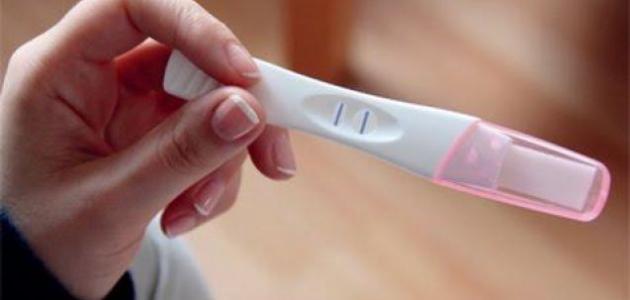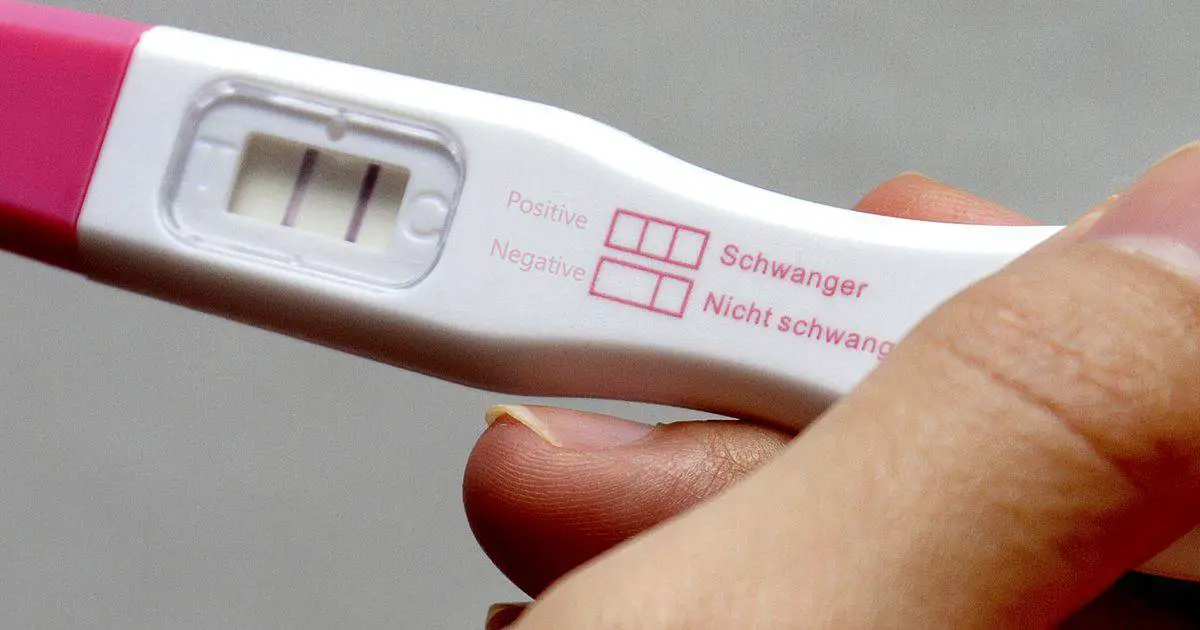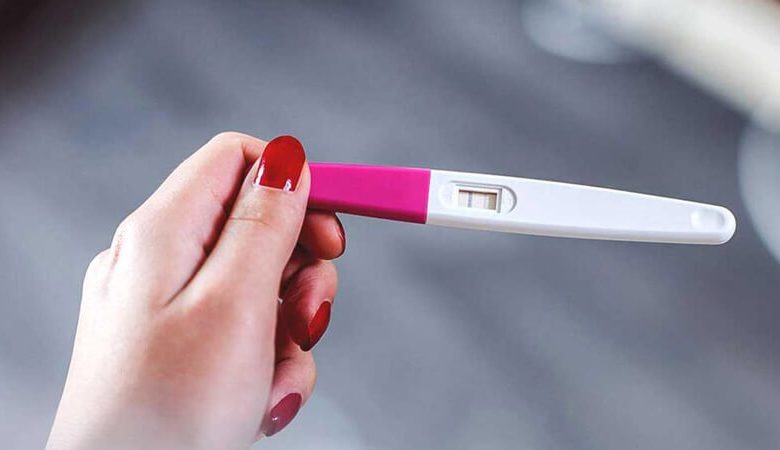I had my period ten days before my period and became pregnant
It has been shown that a pregnancy test can diagnose pregnancy as early as ten days before the menstrual period.
Recently, a woman shared her story on social platforms stating that she had taken a pregnancy test ten days before her period was due and the result confirmed the presence of pregnancy.
According to doctors, the fertilized egg settles in the uterine wall about 10 days before the menstrual period.
Therefore, some women may be able to see pregnancy through early symptoms that appear before the expected menstrual cycle begins.
However, doctors advise waiting for two weeks after ovulation to ensure the validity of the test result, as it is not possible to obtain an accurate result in less than that.
In most cases, the pregnancy hormone is still weak early in pregnancy, making it difficult to get a correct result.
Of course, it is necessary to test again after a few days to ensure that the result is correct, especially if you have not yet waited for your period.
We should also remember that there may be other possibilities for body changes and symptoms that occur in this period, including other health problems.
| Marker | Describe |
|---|---|
| Increase in breast size | Swelling and tenderness in the breasts |
| Abdominal distension | A feeling of bloating or pressure in the abdominal area |
| mood changes | Unusual mood swings, irritability, or constant fatigue |
| Increase in fatigue and exhaustion | Feeling extremely tired and exhausted for no apparent reason |
| Changes in sexual desire | Increase or decrease in sexual desire |
| Change in the digestion process | Digestive system disorders, such as nausea and vomiting |
| Constant desire to urinate | Feeling a frequent need to urinate |
| Disorder in the sense of taste and smell | Change in the taste and smell of food |
| high temperature | A slight increase in body temperature |

Does pregnancy appear in the digital blood test a week before the period is due?
When it comes to pregnancy testing, a digital blood test is one of the most accurate and reliable methods.
Therefore, many people wonder if a digital blood pregnancy test can detect pregnancy a week before their period.
The answer is yes, this can be possible in some cases.
A positive blood pregnancy test result can appear within 10-12 days of intercourse and fertilization.
Therefore, it may be possible to perform a blood pregnancy test approximately 4 days before your period.
However, it is best to perform the test the day after a missed period to obtain a more accurate result and avoid the need to retest if your period is late.
Regarding hormonal pregnancy analysis, a week after fertilization of the egg is considered the ideal time to conduct the test.
This is done a week or 5 days before the period.
However, it is more accurate to wait until the period itself.
However, the ideal time to take a blood pregnancy test, whether digital or hormonal, is after your period is a full week late than expected.
This waiting is considered one of the best times for examination, regardless of the type of test used.
If you're wondering when a blood test shows pregnancy, the answer is that the test can be done early in pregnancy, specifically around 6-8 days after ovulation.
But the ideal time to get tested is within seven to 14 days of a missed period.
Performing a pregnancy blood test early may result in a “negative” result despite the presence of pregnancy.
This is due to the fact that the concentration of the pregnancy hormone in the blood does not appear until three days have passed after fertilization of the egg.
Does pregnancy appear 11 days before the period?
Regarding the symptoms that may appear 11 days before the period, they may include pain or tingling in the uterine area, but these symptoms are not considered conclusive evidence of pregnancy, and may be merely speculative signs.
Although there are commercial pregnancy tests that claim to be able to detect pregnancy 11 days before your period is late, it is better to wait for your menstrual period and take a pregnancy test after that, because the pregnancy hormone during this period may not appear clearly in the analysis and therefore it may not be The result is accurate.
If the menstrual period is delayed, this is considered a strong sign of pregnancy, and in this case it is recommended to wait a week after the menstrual period is delayed before taking a pregnancy test.
What are the symptoms of pregnancy 10 days before your period?
- Increased anxiety and agitation: Some women experience feelings of anxiety and agitation during this period.
- Feeling tired and exhausted: Some women may feel tired, exhausted, and lazy, which prevents them from performing daily activities normally.
- Abdominal bloating and pain: Some women may feel bloating and abdominal pain, especially in the lower abdomen, until their menstrual cycle begins.
- Minor bleeding: If you are already pregnant, minor bleeding may occur during your menstrual period. It does not resemble menstrual blood in nature and does not last for a long time.
- Increased vaginal secretions: Vaginal secretions may increase in the first three months of pregnancy, as a result of hormonal changes.
Menstrual-like cramps and lower abdominal cramps may appear, with a constant feeling of abdominal bloating. - high heart rate;
- An increase in basal body temperature: An increase in basal body temperature may occur in some women 10 days before the menstrual period, as a result of hormonal changes associated with pregnancy.
- flatulence;
- Light vaginal bleeding (spotting).
- Nausea and vomiting: Some women may experience nausea and vomiting during early pregnancy.
- Hot flashes: Some women may feel a sudden increase in body temperature, especially in the face and chest area.
- Feeling of a strange taste in the mouth.

How much pregnancy hormone must be in order for the pregnancy sac to appear?
In some cases the gestational sac is not noticed when it arrives when the hCG hormone is low.
But the gestational sac is seen via ultrasound when the hCG hormone is high enough to detect.
When pregnant with preterm pregnancy, the hCG hormone is naturally high.
The data also states that pregnancy hormones can also be elevated in the case of an ectopic pregnancy.
Typically, the gestational sac is seen via ultrasound when hCG levels reach about 1000-2000 units/ml.
In the case of a twin pregnancy, the hCG hormone is significantly elevated.
However, the size of the visible gestational sac can depend on its actual size early in pregnancy.
Data also indicate that a gestational sac can be seen once hCG levels rise to about 1500-2000 units/ml.
What is the fastest way to find out about pregnancy?
Many studies have shown that home pregnancy tests are faster and more accurate than consulting doctors to determine the presence of pregnancy.
These tests can be relied upon to detect the presence of pregnancy from the first day of the absence of a menstrual period.
Among the various methods for analyzing pregnancy at home, the home pregnancy test available in pharmacies is the most common.
This test is considered a reliable and scientifically proven way to detect pregnancy.
The method of using a home pregnancy test is easy and simple, as a small drop of urine is placed on the test strip, and then waits for a few minutes for the result to appear.
The presence of pregnancy hormone in the urine is measured, and if the percentage is high, this indicates the presence of pregnancy.
Although these tests are available in pharmacies and easy to use, it is important to follow the test instructions carefully to obtain correct results.
It is also preferable to perform the test at specific times of the day, such as the morning, to obtain the best results.
In addition, blood tests for pregnancy performed by doctors are more accurate than a urine test.
A blood test can show whether there is pregnancy even before any other apparent signs appear.
Despite the accuracy of blood tests, it is preferable to start with home tests as an easy and quick way to confirm the presence of pregnancy.
If a positive result appears, it is recommended to go to the doctor to confirm the result and monitor the pregnancy properly.
When do signs of pregnancy appear after fertilization, how many days?
Signs of pregnancy after insemination may begin to appear about 5 days after successful ovulation.
Some of these signs are light bleeding or blood spots, which are a clear indication of pregnancy.
As for the signs of successful ovulation, they can be observed through several signs, such as an increase in the body’s core temperature and a change in the cervical mucus to become thicker and darker.
This is reflected in noticeable health conditions after the successful vaccination process.
Although some pregnancy symptoms appear a week after ovulation or fertilization, doctors advise against performing a pregnancy test before one to two weeks of the next menstrual period that occurred before fertilization.
It is worth noting that the fetus must remain for up to 24 hours after signs of fertilization of the egg appear in order to conduct a pregnancy test accurately and without errors.
Since the pregnancy hormone needs time to appear in the pregnancy test after implantation, it can be concluded that the appearance of pregnancy in the pregnancy test occurs about 8 days after the date of ovulation, and about 10 to 12 days after the date of fertilization.
It is also possible for a sign of implantation or slight bleeding to appear 10-12 days after successful insemination.

Is the lack of solubility of sugar in the urine evidence of pregnancy?
It is believed that the pregnancy test using sugar is based on the assumption that the pregnancy hormone HCG prevents the dissolution of sugar in the urine, leading to the formation of clumps of sugar.
However, there is no scientific evidence to support the effectiveness of this test.
Sugar generally dissolves in the urine gradually, even if the pregnancy hormone HCG is present in the urine.
Studies do not indicate that there are other factors that lead to sugar clumping in the urine.
Furthermore, there is no evidence to prove the accuracy of sugar pregnancy tests.
Researchers point out that turning sugar into lumps in the urine does not necessarily mean pregnancy, but rather the urine may contain other factors that prevent it from dissolving.
Therefore, this test is not accurate and cannot be relied upon to confirm pregnancy.
How was pregnancy detected in the past?
An online report mentioned one of the oldest pregnancy tests dating back to ancient times, where ancient Egyptians used wheat and barley grains to detect pregnancy.
In that period, women urinated in separate parts, and elderly grandmothers and midwives used the hand to recognize early signs of pregnancy and calculate the months of pregnancy.
Among the most recent tests of that period is the wheat and barley test that began in the era of the Pharaohs BC.
The woman urinated on wheat and barley seeds for several days, and if the seeds sprouted, it meant that she was pregnant.
This test came not only to detect pregnancy, but also to determine the sex of the expected fetus. If barley grows, the fetus will be male, but if wheat grows, the fetus will be female.
There were also other simple tricks used to detect pregnancy during that period.
of between it:
- Wheat and barley test: An onion is inserted into the woman’s vagina overnight, and if the onion remains light in color early in pregnancy, the cervix, anus, and vagina can be detected through changes in color to blue, purple, or red.
- Using baking soda: Using baking soda is a common element in detecting pregnancy at home.
Add 2 teaspoons of baking soda to a teaspoon of urine and wait to check for color changes. - Urine test: Putting a piece of cotton or cloth in a cup containing morning urine and leaving it for some time was one of the common ways to check pregnancy in that period.
If there are changes in the color of the fabric or cotton, this indicates pregnancy.
How do I know that I am pregnant through the paste?
The common belief is that if toothpaste reacts with urine, this indicates pregnancy.
This idea is based on the assumption that urine contains a substance that causes a reaction with the components of toothpaste, leading to a change in color or the appearance of foam.
To perform this test, a few drops of the woman's urine are placed in a small bowl, then a little white toothpaste is added to the urine and mixed together.
It is believed that if the paste changes color or foams, the test result is positive and indicates pregnancy.
If no reaction occurs, the result is negative.
However, we must note that the toothpaste pregnancy test is not accurate in the true sense of the word.
The foam that appears may be the result of the reaction of the calcium carbonate in the paste with amino acids in the urine, and does not necessarily mean that pregnancy has actually occurred.
However, some still use this method as a home test to find out if you are pregnant or not.
It must be noted that there is no strong scientific evidence confirming the validity of this method.
If you feel symptoms such as delayed menstruation, nausea, or fatigue, it is best to resort to a scientifically recognized home pregnancy test or go to the doctor for a thorough examination.
Although many women use this method to confirm pregnancy, it is better to rely on pregnancy tests available in pharmacies or consult a doctor, as these methods are considered the most accurate and reliable.
What are the signs of pregnancy on the face?
- Melasma (brown spots) on the face around the cheeks, nose and forehead.
- A dark line extending from the navel to the pubic hair.
- Stretch marks.
- young love.
The most prominent signs of pregnancy on the face are the appearance of melasma, dark spots or hyperpigmentation.
In the first trimester of pregnancy, changes occur in a woman’s hormones that lead to the appearance of acne on the face.
However, other signs can also appear on the face during pregnancy, including:
- Facial redness due to increased blood flow.
- The appearance of pigmentation and dark spots.
- Facial skin sensitivity.
- the appearance of acne;
- Increased facial hair growth.
We must point out that it is not necessary that these signs appear on every pregnant woman, as their severity and appearance vary from one woman to another.
In addition, there are some other symptoms that can appear on the face during pregnancy, such as a metallic taste in the mouth and swelling of the nose.
